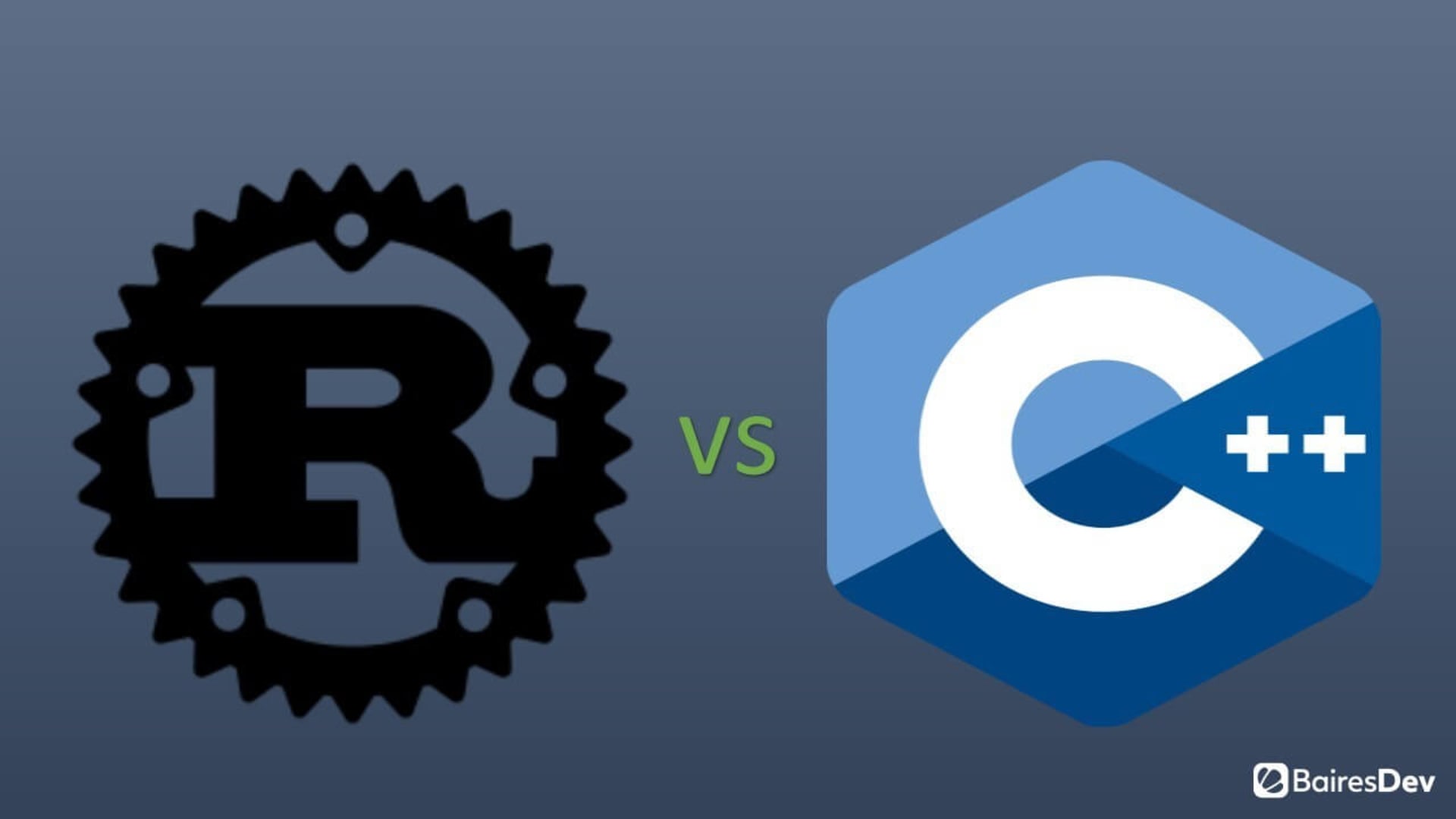C++ is a venerable programming language with more than 36 years in its long history. It is a staple in the programming scene, and most individuals, even those who don’t work or dabble in the technology space, have probably heard of it at one point or another.
So, can the newcomer Rust, released in the early 2010s, match the versatility, speed, and other qualities of C++, its much older counterpart? In contrast to C++, Rust is not nearly as well known. But, of course, that could very well change.

Today, there are many Rust developers who swear by the language, just as there are many programmers who swear by C++. And the two languages are often compared, thanks to certain overlapping features that the languages both possess. Here, we will assess the key features Rust offers and C++ offers and present a clearer picture of Rust vs C++ overall, particularly in terms of the performance they each can provide.
| Aspect | C++ | Rust |
| Memory Safety | Prone to memory safety issues (e.g., buffer overflows) | Designed with memory safety in mind, prevents common errors through ownership model |
| Concurrency | Offers manual control but can be error-prone | Provides safer concurrency primitives, making concurrent programming more reliable |
| Runtime Performance | Highly optimized, with control over low-level details | Comparable to C++, slightly overhead due to safety checks |
| Compilation Speed | Varies, but can be slow for large projects | Generally slower due to more complex compilation checks for safety |
| Error Handling | Exception-based, can lead to performance overhead | Uses Result/Option pattern, which can be more predictable in terms of performance |
| Standard Library | Extensive, with many legacy parts | Modern and minimalistic, focusing on safety and performance |
| Use Case Flexibility | Widely used in various domains, including system programming and games | Increasingly used for system programming, web assembly, and embedded systems |
C++ in a Nutshell
First, let’s take a look at C++ and how and why developers use it today. And no discussion of C++ is complete without mentioning C and the C family in general.
C and its object-oriented cousin C++ are 2 of the most well-known and venerable programming languages on the market. When speed is the main factor in software development or when resource management is an issue, these 2 languages are still the default go-to, even decades after their creation. In fact, C dates back even further than C++, its offshoot, to 1978.
Every few years or so, an individual or group of developers will try to build and release what has come to be known as “C killers,” programming languages designed from the ground up to provide the same benefits as the C family, while attempting to reckon with some of the most well-known issues associated with the C family at the same time. These would-be C killers are generally met with mixed success.
Just as an example, we have Java and C#, both of which are amazing and have built great resources and communities. And if you take into account the mobile market, Java has probably become the most used programming language in the world.
Rust in a Nutshell
Rust, as we have noted, is a much newer language. It was introduced as a powerful, all-purpose, very fast programming language that is focused both on safety and performance. Rust is an example of one of the latest languages that have been touted as a “C-killer.”
Unfortunately for those eager to see the C family gone forever, it doesn’t seem like Rust will necessarily be the chosen one, although it has still emerged as a great and useful language in its own right.
Moreover, Rust does a lot of things right, and it is an amazing alternative for people who are looking for powerful programming languages with modern sensibilities. We will take a look at some of its capabilities and qualities below.
A Quick Note
Before we go any further, a word of caution: here, in evaluating these two languages, we are not just thinking about speed. Objectively comparing the speed of languages is difficult, as there are many variables involved, from how each language handles certain tasks to the experience and inventiveness of the developer who is writing the code. However, we can use some metrics to compare speed and performance in an unbiased manner. We will illuminate this a bit further below.
A quick example: Python is considered one of the slowest languages on the market, but an advanced Python developer can make faster programs than a person who is working on C for the first time.
This is something that is important to keep in mind while you are reviewing the section on benchmarking information and the table that we have provided below. Unbiased benchmarking metrics, while difficult to evaluate when you are comparing Rust code and C++ code, give a clearer picture of overall speed and performance.
Now that we got that out of the way, let’s dive into Rust’s features and compare them to C++ to determine which one is the better language for your project.
Rust Vs C++ Performance Benchmarks
While it is quite difficult to benchmark the Rust language and C++ for performance, it is possible, and it starts with looking at the source code. Here is an excellent resource for understanding the C++ and Rust comparison in terms of performance benchmarks further, and you can take a closer look at the table below to better understand them.
In a nutshell, while Rust code and C++ code are comparable in terms of overall speed and performance, Rust often outranks C++ in multiple instances when we consider unbiased benchmarking.
High-Level and Low-Level
Both C++ and Rust are considered “low-level” languages, or at least lower-level than other popular high-level languages like Javascript or the aforementioned Python. But what does that mean exactly?
Computers follow arithmetic and logical instructions to accomplish whatever task they have been programmed to accomplish. For example, to display the text you are reading right now, your CPU is sending it a signal via electrical currents giving instructions on the color of each pixel, creating the image you are seeing.
A computer doesn’t know what the letter A is, but by following mathematical instructions it can draw it on a screen. Those instructions are called machine code. At the other end of the spectrum, you have natural language, the way we humans speak, read, write, and otherwise communicate with one another.
A programming language basically serves as an intermediary between machine code and human language. It is the way in which we communicate with machines, and therefore, it can be more or less difficult to translate and comprehend. Developers, essentially, are giving machines sets of instructions on how to act and behave through programming languages — but we don’t have the same vocabulary, and that is why these languages are necessary.
To summarize, then: when someone says that a language is low level, what they are saying is that it is closer to machine code than to the way we speak and communicate.
The higher level a language is, the more it looks like human language, but at the same time the more processing power it takes to turn that program into machine code. That is why languages like Python are very readable but are also slow and unoptimized.
Suffice it to say, Rust and C++ fill a very similar need, that is, a code that it is readable but that can run fast enough for heavy-lifting software like operating systems or drivers.
Rust: Security First

Rust was created in 2010 by the Mozilla Foundation. It started as a side project of one of the developers that quickly grew as the foundation realized the potential it had for developing their software. THis was an assessment that proved to be true since in its short lifespan, Rust has become one of the most loved languages by developers.
One of the biggest reasons why that happened is that Rust has 2 killer features that make it stand out among its peers: safe concurrency and memory safety.
Concurrency is the ability of a program or software to execute several of its parts out of order and/or in a partial order, which in turn means that you can have parallel execution of concurrent processes.
Let’s say that you have a program with 10 instructions. Instead of having to run each one at a time, you can have several processors running several instructions concurrently reaching the same result in less time.
While other languages leave the threading up to the developer, manual threading requires a level of knowledge that not every developer has. Rust checks for Ownership statically to make sure that a developer isn’t inadvertently creating a bug by having the program access information when it shouldn’t.
The same goes for memory management. Typically, memory is either handled by the developer directly or left to what is known as garbage collecting, that is, letting the computer figure out what information is no longer being used, and freeing up the memory.
While garbage collecting is amazing, it can be pretty slow and expert developers often find it constraining. Instead of GC, Rust avoids null pointers, dangling pointers, or data races all together with safe code. Fewer bugs all around imply faster development times.
To put it simply, Rust is like driving a racing car with a safety belt: it’s a lifesaver for someone who is just learning how to drive and it’s a good safety measure for an expert driver, even if they are unlikely to crash. That’s what memory safety is all about.
C++: The Tinkerer’s Dream
C++ is 36 years old, and in that time it has garnered thousands upon thousands of libraries as well as a knowledge base that it’s simply baffling. No matter how crazy or out there your idea is, odds are that someone has already done something like it in C++.
Additionally, C++ is a tinkerer’s dream come true. Few languages give as much freedom to the developer as the C family. Like a finely-tuned Stradivarius, it’s a tool that in the hands of a maestro can truly create a work of art.
Do you have Windows OS? You are using C++. Do you like YouTube? That’s the language that handles the video processing. Ever played a game made in the Unreal engine? That’s running on C++ as well. There isn’t a better poster child for the concept of multipurpose language.
As a company looking for developers, the talent pool for C++ programmers is a thousand times bigger than Rust, at least for now. Who knows what the distribution will look like in 10 years?
More libraries mean less development time as there are more tools out there to be freely used by developers and, all in all, there is plenty of evidence that points out that C++ is still the fastest object-oriented language available.
C++ vs. Rust – Ease of Use
There is no question that Rust is far easier to use than C++. It also has a significantly lower learning curve, along with extensive community support, libraries, tools, documentation, and additional resources that newcomers to Rust can take advantage of when they are first learning how to use the language.
In contrast to the Rust language, C++ is widely considered to be a difficult and complex language to tackle, with only very experienced developers turning to the language on a frequent basis. For one, C++ includes a multitude of diverse dialects that developers are required to learn before they can fully utilize C++.
Bear in mind, too, that Rust frequently ranks as one of the most-loved languages in the world in Stack Overflow’s annual Developer Survey, while C++ generally sits squarely on the most-dreaded list. This should hardly come as a surprise to developers, many of whom have turned away from C++ in recent years, often in favor of Rust as a better alternative.
The Future Of Rust & C++
As you can see, there are many pros and cons to using both Rust and C++. And you may be wondering: what does the future of these two somewhat similar languages look like?
The fact is, of course, none of us has that answer. C++ outranks Rust in terms of longevity, but, as we know so well, it is not so difficult for languages to wain in popularity and even be retired altogether. And yet C++ continues to have extensive community support.
Meanwhile, Rust comes with a lot of advantages, such as ease of use and a low learning curve. That means that it is more likely to attract a greater number of programmers, particularly those who are beginners in the space, in the coming years. It also shines in the case of memory footprint and has fewer memory safety issues. That said, it does have a much smaller community, perhaps due to its young age. And, of course, that could very well change in the future.
So, can we predict what will come of Rust and C++? It seems unlikely that either will disappear in the near future. C++, along with its family of C languages, remains a staple in the programming space and is even the first choice developers turn to when working on certain types of projects.
And while Rust is a newer language, it is only gaining popularity. In 2022, it was crowned the most-loved language in Stack Overflow’s Developer Survey, marking its seventh year in a row in this position. So, it is also clear that Rust is on an upward climb.
In short, we can expect long, illustrious paths for both of these important languages.
Which One to Pick?

This comparison is quite a toss-up, and it would be a disservice to point at one language and declare it a winner. Fortunately, there doesn’t have to be one: Rust and C++ are very similar and integration between them is possible. Both languages have proven themselves invaluable assets in software development.
If your project requires speed then you can’t go wrong with either choice — it is simply a preference between the safety of Rust or the customizability of C++, along with other features that come with the two options.
What to Consider
That said, we have reviewed the qualities and limitations of both of these languages, and you can judge for yourself which one is the better choice for your project or projects. After all, as you have probably gleaned, developers apply Rust and C++ to different types of work and in different ways, although there is often some overlap in terms of the projects that are appropriate for the two.
So, when you think about the best choice between Rust vs C++, think about features like:
- The experience and seniority of your developers or developer bases you can tap into
- The importance of high performance code to your project
- Memory safety and memory management
- Community support and resources available
- Your current stacks
- The operating systems you want your program or system to run on
- The necessary functions you need to perform
- The types of and complexity of the projects you typically work on at your organization
- Any other factors you deem important for you and your company
These, of course, are just a few of the many factors that will go into your decision. A lot depends on the unique product or project you are devising. Suffice it to say, there are some cases when both C++ and Rust will appear in a business’ stacks, particularly when they have a large, varied product catalog and arsenal.
Rust Vs C++ FAQ
Is C++ faster than Rust?
C++ is not necessarily faster than Rust. It is difficult to compare the two languages in terms of speed and performance directly. Generally speaking, Rust and C++ are comparable in terms of overall speed and performance, but when we take into account unbiased benchmarking, there are many instances in which Rust will perform even better than its counterpart.
Why is Rust slower than C++?
Many developers believe that Rust is slower than C++, but that is not necessarily true. At face value, it may seem like Rust is slower than C++, but that is only when you’re looking at the overall picture, not the unbiased benchmarking data that is essential to consider when directly comparing Rust to C++ in terms of performance.
In fact, while developers can sometimes write and execute C++ programs more quickly than they can Rust programs, in doing so, they are ignoring many of the fundamental errors in the language, which will likely lead to more extensive problems down the line.
Is Rust easier than C++ to learn?
Rust is widely considered easier to learn than C++. C++ is notoriously difficult, with experienced and senior developers turning to it for the most part. Meanwhile, Rust is thought to have a low learning curve. It is also easy to use and has a number of resources to help developers who are new to the language get started. That said, C++ does have a wide community of support available for assistance when need be.
Is Rust growing in popularity?
Rust is growing in popularity every year. In 2022, it marked its seventh year in a row as the most-loved language in Stack Overflow’s annual Developer Survey, with 87% of survey respondents saying that they were planning to continue using it. Meanwhile, it was tied with Python as the most-wanted technology in the same survey. So, it is fair to say that Rust is already popular and continuing an upward climb.









